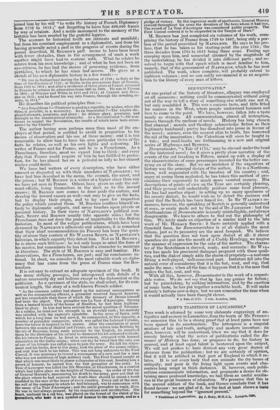DERWENTWATER.*
AT one period of the history of literature, allegory was employed on all occasions ; nothing could be communicated without going. out of the way to tell a story of something else which .was not it, but only resembled it. This was a curious taste, and little fitted for success in the West, where people understand business and love to come to the point. We have, however, fallen into a taste nearly as strange. All communication, almost all instruction, passes through the medium of novels. History has long chosen that channel ; morals and theology acknowledge fiction as their legitimate handmaid ; poetry has dissolved into prose in favour of the novel ; science, even the nearest akin to truth, has borrowed the aid of the imagination ; the Catechism will soon be taught in a tale ; and road-books are forthcoming in a new and original series of Highways and Byeways. Derwentwater, "a Tale of 1715," may be classed under the head of the historical novel ; for it gives a pretty close narrative of the events of the out breaking in Fifteen, mixed up with a display of the characteristics of some personages invented for the better car- rying on of the story. But we are mistaken if the exposition of history was the principal design of the author. He is a 1■Torthurns; brian, well acquainted with the beauties of his country ; and, angry at seeing them neglected, he has taken this method of pro- claiming their superiority to much more vaunted scenery. His descriptions of points of view on the Tyne are certainly pleasing, and their perusal will undoubtedly produce some local pleasure. He has had another object : in setting up so many specimens of his county dialect, he would wish us to detect the raciness and point that the Scotch has been famed for. In Sir WALTER'S ro- mances, however, the sprinkling of Scotch is generally understood at once, or easily made out by the aid of Dr.JAIIIESON : but the Northumbrian of Derwentwater is nearly unintelligible, and always disagreeable. We leave to others to find out the philosophy of this. We lately made an objection of a similar kind to the late work of Mr. HORACE SMITH : it there certainly applied with a threefold force, for Zummerzetshire is of all dialects the most Odious, just as its peasantry are the most lumpish. We believe that the question does not turn upon dialect at all: if clever speeches are put into the mouth of a Cuddy Headrigg, we forgive the manner of expression for the sake of the matter. The charac- ter of the Scotchman is shrewd, ready, and sarcastic : Sir WAL- TER has made his provincial dialogues pregnant with these quali- ties, and the dialect simply adds the charm of propriety—a costume fitting a well-played, well-conceived part. Imitators fall into the natural error of considering that it is the hat, coat, and wig, that make the man ; when all the time it happens that it is the man that makes the hat, coat, and wiz.
With all this, however, Derwentwater is the work of a respect- able writer. We do not say that he has any genius for fiction; but by painstaking, by seeking information, and by the exertion- of some taste, he has put together a readable book. It will make nobody's fortune now-a-days, but we can remember the time when it would actually have been thought clever.
* A Tale of 1715. 2 vols. London, 1830.


























 Previous page
Previous page